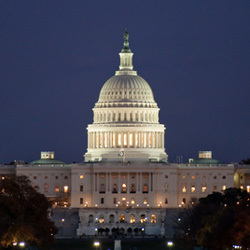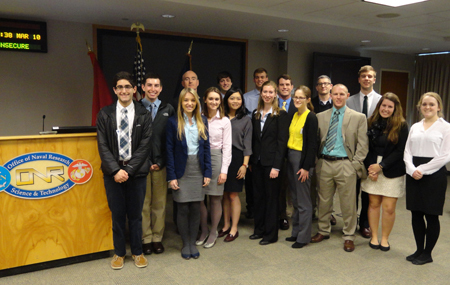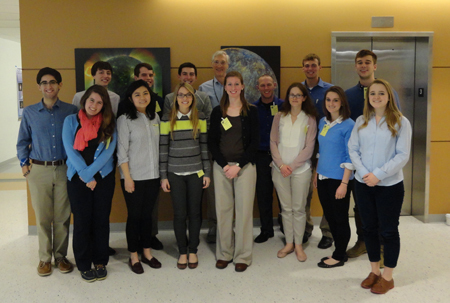

Last week during spring break, students in the College of Science and Center for Social Concerns seminar, Science Policy Ethics: Guiding Science Through the Regulation of Research and Funding, traveled to Washington, D.C. to meet with individuals and agencies at the intersection of science and government.
Now in its second year, the seminar explores the life cycle of science in Washington through the framework of values, ethics, and Catholic Social Teaching. Specifically, the seminar examines why Congress invests federal funds into scientific research, how research is regulated and priorities are set, and how science is communicated among scientists, lobbyists, government, federal agencies, and industry.
The class was made up of 15 undergraduate and graduate students from across the College of Science, all of whom are actively engaged in research in their respective fields:
-
Michael Ahlers ’15, Chemistry
- Rachel Cotton ’14, Biological Sciences
- Ryan Davila, ’15, Biological Sciences and Political Science
- Nick Deason, ’15, Biological Sciences
- Michael Fliotsos ’16, Science-Business
- Michael Kipp ’14, Biological Sciences
- Katrina Magno ’15, Physics
- Josh Mason, Ph.D. Student, Biological Sciences
- Catherine McQuestion ’16, Environmental Science
- Joe Mueller ’16, Biological Sciences
- Doug Rice, Ph.D. Candidate, Biochemistry
- Laura Shute ’15, Biochemistry
- Stephanie Terpening ’16, Biological Sciences and English
- Valerie Verdun ’14, Biological Sciences
- Anna Woodard, Ph.D. Candidate, Physics
In preparation for the trip, the class met weekly to hear from guest speakers and Notre Dame faculty with experience in science policy, communication, ethics, or Catholic Social Teaching, including, Greg Crawford, dean of the College of Science; Don Howard, director of the Reilly Center for Science Technology and Values; Kathie Olsen, Ph.D., founder and managing director of ScienceWorks; Margie Pfeil, assistant professor of theology; Peter Burns, Masssman Professor of Civil Engineering and director of the Energy Frontier Research Center; Norb Wiech, Ph.D., CEO of Lysomics, Sharon Stack, Ann F. Dunne and Elizabeth Riley director of the Harper Cancer Research Institute and professor of chemistry and biochemistry; Joyce Coffee, managing director of the Notre Dame Global Adaptation Index (ND-GAIN), and Jennifer Tank, Ludmilla F., Stephen J., and Robert T. Galla Professor of Biological Sciences
Dominic Chaloner, associate research professor in the College of Science, also joined the group for several meetings in Washington. “The Science Policy Ethics Seminar visit to Washington D.C. provided Notre Dame students with unparalleled insights about the many issues confronting a variety of government and government related-agencies; specifically how those agencies develop and implement solutions to many of the world’s challenges,” said Chaloner.
The week-long seminar included meetings with the following individuals and agencies:
- Rear Admiral Sandra Kweder, M.D., deputy director of the Office of New Drugs at the Food and Drug Administration (FDA), as well as Larry Bauer and Chris Leptak, M.D., Ph.D., from the FDA Rare Diseases program.
- Rear Admiral Matthew Klunder and Dr. Larry Shuette of the Office of Naval Research.
- At NASA Goddard, the group met with Dr. Michelle Thaller, Dr. Molly Brown, and Nobel Prize winner Dr. John Mather. Students toured the astrobiology lab, and the largest class 10 clean room in the world – where the James Webb Space Telescope is currently being assembled.
- Emily Conron ’13 and Neeraj Mistry of the Sabin Vaccine Institute and Global Network for Neglected Tropical Diseases, and National Institutes of Health (NIH) Bioethicist Sam Garner
- Dr. Teresa Fryberger of the National Academy of Sciences’ Board on Chemical Sciences and Technology, and Dr. Patrick Kelley of the Institute of Medicine Board on Global Health
- The NIH and Uniformed Services University of the Health Sciences, led by Captain Phil Coyne ‘76, M.D. , who gave students an overview of the grant application process and funding landscape for global infectious diseases.
- Dr. Steven Walker ’87, ‘97, deputy director of the Defense Advanced Research Projects Agency (DARPA), and Mike Arnone ’94 of DARPA Public Affairs
- Notre Dame’s Office of Federal and Washington Relations – Vice President John Sturm ‘69, Leslee Gilbert of Van Scoyoc Associates, and Laura Dean of ScienceWorks.
- Congresswoman Jackie Walorski (IN-02), and Congressman Larry Bouchon’s Office (IN-08), a member of the House Committee on Science, Space, and Technology.
Student leaders Katrina Magno and Rachel Cotton wrote the syllabus, invited speakers, and scheduled meetings for the week in Washington, working with Dean Crawford, Kyle Lantz in the Center for Social Concerns, and Notre Dame’s Office of Federal and Washington Relations.
“To have been given the opportunity to take advantage of Notre Dame’s extensive alumni network and connections in the Washington D.C. area in order to explore both the intricacies of public policy and cutting-edge scientific innovation simultaneously—in addition to a critical analysis through the lens of Catholic Social Teaching—was an unforgettable experience,” says student Michael Fliotsos.
For more information, contact Katrina Magno kmagno@nd.edu or Rachel Cotton rcotton1@nd.edu